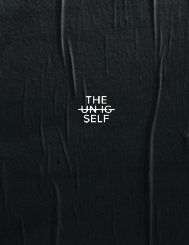Rise: Fashion & Activism Magazine
You also want an ePaper? Increase the reach of your titles
YUMPU automatically turns print PDFs into web optimized ePapers that Google loves.
SAMUEL KROST
COMBINES FASHION, COMMUNITY,
AND ACTIVISM IN HIS NEW LABEL
Article By Nicky Campbell | Image By Scott Camaran
The 1960s was an era of defiance, characterized by riots and protests
by a young generation that desired change – for women’s rights,
military intervention, and civil rights. This youth-led activism serves
as the inspiration behind KROST, a luxury streetwear label that puts
community first.
Designed and produced in Los Angeles, KROST just made its New York
debut with the launch of a SoHo concept store at 357 Canal Street.
Spearheaded by founder Samuel Krost with the help of designer Scott
Camaran, the young entrepreneur is using his background in fashion
to make his mark on the industry.
With a capsule collection composed of lux hoodies and leather goods,
Krost aims to be a “vehicle for building a sense of community.”
He’s doing this by partnering with the organization March for Our
Lives, demonstrating, in his way, how fashion has a responsibility to
give back.
“March for Our Lives was born out of the devastation brought by the
shooting at Marjorie Stoneman Douglas High School and is the prime
example, and the brand’s biggest inspiration, of youth coming together
to support one another for a greater purpose – to propel a safer
tomorrow,” Krost said.
“We’re proud to be one of the first partnerships with the organization
within another industry, with the goal of supporting them in a
financial capacity through small capsule collections while also
bringing additional awareness to their cause through all social and
digital marketing initiatives.”
Expect more such partnerships in the label’s future. In line with the
brand’s motto “Support Your Friends,” Krost hopes to mobilize a new
generation of young creatives far and wide to take the brand to new
heights. He has a high-profile network behind him – think Gigi Hadid
and @fuckjerry – and aims to utilize this to generate real change.
As Krost put it, “We’re here to partner and collaborate with as many
creatives, artists, photographers, videographers, and other brands
in the world that can help create additional vehicles to propel this
message and build our community.”
it is genuine and personal. “Often people ask me
about getting involved in service and philanthropy,
and my first advice is: Make sure it’s real and it’s
transparent,” he told Gabriela Hearst, herself an
activist for Planned Parenthood and champion for
sustainability, in an interview for Vogue. “People are
very smart today.”
And he’s not wrong. Many consumers criticize the
fashion industry for its lack of social conscience,
or remain skeptical when it appears. Case in point:
Chanel’s SS15 preview of the Women’s March on
Washington was seen both as the most political
fashion show in recent memory and as a commercial
caricature of a social movement. Yet while many argue
the fashion industry is too exclusive to champion
social issues, they forget clothes have long been a
catalyst for change. After Paul Poiret condemned
the corset, Chanel popularized the suit and looser
silhouettes for women. And even before screenprinting
made it possible to declare oneself a feminist,
Mary Quant was an inadvertent representative of
women’s liberation. The first to put the miniskirt in
the mainstream, Quant helped normalize sexuality
and the hiked hemlines that came with it.
Nevertheless, most of the industry spent years being
silent on political issues while causing controversy
of its own, begging critics to question why now and
if the messages are genuine, or if brands are merely
after socially conscious consumers. Speaking up is
great, but many question if the occasional slogan
tee is enough; actions speak louder than words,
even if those words are worn. But despite being a
repeated antagonist of diversity, body positivity,
and politically correct appropriation, the industry
has significant leverage as an agent for change and
who are we to silence designers now that they’re
wielding it. Fashion has been and continues to
be an industry of creatives of every race, religion,
sexuality, and gender whose rights are now in
question, so the issues they’re advocating for are
viscerally felt. Whether their collections are judged
as a publicity stunt or political statement, designers
and consumers alike can’t deny that silence in this
sociopolitical climate is deadly.
8
FASHION & ACTIVISM





